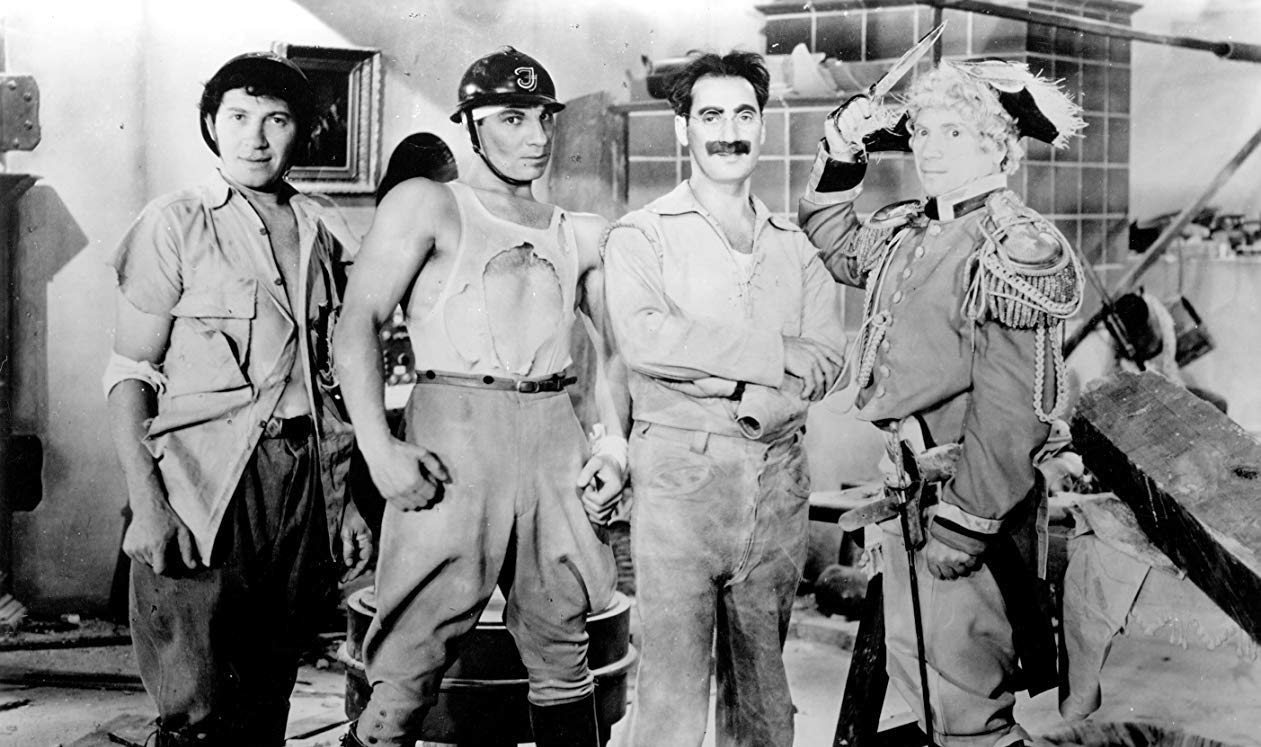The people believe the government has been mismanaged and demand it be placed in the new hands of a progressive fearless leader. Newly installed, the president presides over his first executive meeting, during which he blithely insults all of his cabinet directors. “I spend all my time and energy to my duties and what do I get?” one pushes back. “You get awfully tiresome after awhile,” the president responds.
<span class="s1" <this="" is="" not="" “fake="" news”="" coming="" from="" the="" current="" white="" house.="" this="" real="" comedy="" courtesy="" of="" director="" leo="" mccarey,="" credited="" screenwriters="" bert="" kalmar,="" harry="" ruby,="" arthur="" sheekman="" and="" nat="" perrin="" four="" marx="" brothers,="" with="" invaluable="" support="" margaret="" dumont,="" edward="" kennedy,="" louis="" calhern="" raquel="" torres.="" film="" was—is—="" “duck="" soup”="" month="" it="" celebrated="" its="" 85This is not “fake news” coming from the current White House. This is real comedy courtesy of director Leo McCarey, the credited screenwriters Bert Kalmar, Harry Ruby, Arthur Sheekman and Nat Perrin and four Marx brothers, with invaluable support from Margaret Dumont, Edward Kennedy, Louis Calhern and Raquel Torres. The film was—is—“Duck Soup” and it recently celebrated its 85th anniversary.
In 2000, the American Film Institute ranked “Duck Soup” the fifth funniest comedy of the 20th century. We’ll leave for another time whether it is actually funnier than “Some Like It Hot” (No. 1), “Tootsie” (No. 2), “Dr. Strangelove” (No. 3) or “Annie Hall” (you do the math). But it is generally considered by Marx Brothers purists to be the team’s funniest, with no dead spots, gratuitous romantic side plots or even harp and piano solos by Harpo and Chico. It’s non-stop anarchy that was rediscovered and embraced by college-aged Baby Boomers during the Vietnam War, “don’t trust anybody over 30” and Watergate eras.
It has been almost 50 years since that last Marx Brothers revival. At a time of seemingly unprecedented dysfunction in our nation’s capital and public confidence in its lawmakers at an all-time low, is it time for “Duck Soup,” with its farcical take on government, to go viral?

Directed by Leo McCarey (“The Awful Truth,” “Ruggles of Red Gap,” various Laurel and Hardy films), “Duck Soup” is set in the mythological kingdom of Freedonia, where Groucho’s Rufus T. Firefly has been installed as leader by the country’s largest (and don’t think Firefly doesn’t comment on that) financial backer, Mrs. Teasdale (Dumont), Harpo and Chico play two spies hired by Ambassador Trentino (Calhern) of neighboring Sylvania to gather information that would undermine Firefly. Plan B is to gain control of Freedonia is to romance Mrs. Teasdale himself or start a war; whichever comes first. Zeppo plays Firefly’s secretary (he would depart the team following this film).
In adding “Duck Soup” to his pantheon of “Great Movies”, Roger Ebert noted, “‘A Night at the Opera’… contains some of their best work, yes, but in watching it I fast-forward over the sappy interludes involving Kitty Carlisle and Allan Jones. In ‘Duck Soup’ there are no sequences I can skip; the movie is funny from beginning to end.”
“Duck Soup” was the movie that gave Woody Allen’s suicidal character in “Hannah and Her Sisters” a new lease on life. Monty Python was surely playing homage during Holy Grail’s musical number, “Knights of the Round Table” with the knights’ helmets being played like a xylophone as the Marxes did during “Duck Soup”’s “This Country’s Going to War” spectacular. It is perhaps most famous for its mirror scene, an uncharacteristic bit of silent comedy between Groucho and Harpo. (Here’s Lucy and Harpo’s recreation from “I Love Lucy”).
<span class="s4" <there’s="" no="" question="" “duck="" soup”="" is="" still="" funny.="" There’s no question “Duck Soup” is still funny. But is it still relevant? For those who are not fans of the current president, it is hard not to think of him when Rufus T. Firefly, laying down the laws of his administration, sings, “The last man nearly ruined this place/He didn’t know what to do with it/If you think this country’s bad off now/Just wait ‘til I get through with it.”
It is true that Donald Trump shares Firefly’s thin skin; Firefly plunges his country into war when Trentino calls him an “upstart.” But that’s where the parallels end, according to Roy Blount, Jr., whose salute of the film, Hail, Hail Euphoria! is the literary equivalent to home video commentary. By email, he offered, “‘Duck Soup’ remains profoundly tonic in its take on what’s toxic.”

Conventional wisdom labels “Duck Soup” a scathing anti-war satire. Here’s the punchline: It was not intended as such. This according to Steve Stoliar, who as a college student at UCLA in the 1970s led the charge for the re-release of the long stuck in the vaults “Animal Crackers,” which helped revitalize interest in the Marx Brothers, and who chronicled his years as Groucho’s archivist in the memoir Raised Eyebrows: My Years Inside Groucho’s House.
“Groucho alternated between being amused and annoyed by people reading things into the films that were never intended,” he said in a phone interview. “He was the head of a hotel in ‘The Cocoanuts’ and the head of a college in ‘Horse Feathers.’ The writers thought, ‘Where else can we put Groucho where he doesn’t belong?’ and you can’t get loftier than the head of a mythological kingdom.”
During the heyday of the Marx Brothers revival, Groucho was often asked his favorites of their films. He invariably cited “A Night at the Opera” and “A Day at the Races,” which were made for MGM. “It was when the college students started embracing the Paramount films that Groucho started filtering in ‘Duck Soup,’” Stoliar said. “He didn’t think of “Duck Soup” for years because it marked the end of their Paramount contract (the film had received mixed reviews at the time and, while not a bomb, was not as big at the box office as their previous films). Then [legendary producer Irving Thalberg] brings them into the wonderland of MGM and makes two big moneymaking movies. Groucho felt ‘Opera’ and ‘Races’ were their best in terms of story and production values, but in terms of funniness, ‘Duck Soup’ is the obvious winner. You get out of it that war is not good and that countries start wars over seemingly trivial things. That’s fine, but in terms of the artists’ intentions—it may sound simplistic—but Groucho said, ‘We were just trying to be funny.’”
Still, Benito Mussolini took offense and reportedly banned the film in Italy. And radicalized American college kids related to the brothers’ irreverence and thumbing their noses at authority.
So where does that leave us? Will a new generation that has unprecedented access to movies and TV series be moved to re-discover an 85-year-old movie, in black and white, no less? If you count yourself a comedy geek and you haven’t seen it, what are you waiting for? (When you do see it, be sure to let us know what you think!)
By the way, about that title: several were in play before “Duck Soup,” including “Cracked Ice,” “Firecrackers” and “Grasshoppers.” “Duck Soup” was the title of a 1927 Laurel and Hardy short. But what does it mean? Groucho had this explanation for an interviewer: “Take two turkeys, one goose, four cabbages, but no duck, and mix them together. After one taste, you’ll duck soup for the rest of your life.”
(Thanks to Matthew Coniam, author of several books about the Marx Brothers, founder of the Marx Brothers Council Facebook community and with Bob Gassel, and Noah Diamond, co-host of the Marx Brothers Council Podcast, for background on the film)












